A week ago, a fire in Mouraria killed two people and exposed the problems of illegal housing for immigrants. A direct consequence of the housing crisis in the capital, aggravated by the fact that we are dealing with people in extreme social and economic fragility
“Ai, Mouraria
of the nightingales on the eaves,
of the pink dresses,
of the traditional preaching.
Ai, Mouraria
of the processions passing by,
of Severa in a nostalgic voice,
of the guitar sobbing.”
(Fado “Ai, Mouraria”, lyrics by Amadeu do Vale and music by Frederico Valério, popularized by Amália)
There’s that idea of Mouraria as a typical neighborhood, with fados and guitar playing on every corner. It was in this neighborhood that Severa and José Maurício lived, and that’s where Rua do Capelão, sung about by Amália, is located. But all you have to do is walk down a couple of steps and Mouraria is a different place. For a long time away from the hustle and bustle of modernity, with old but affordable houses and a great location in the center of town, Mouraria became, in the second half of the twentieth century, a welcoming place for many people who came from abroad looking for work in Lisbon. First from the former colonies, then from the East, from China and, more recently, from the Asian subcontinent – the so-called Hindustan, a region that encompasses countries like Bangladesh, Nepal, India and Pakistan.
Rajib arrived in Portugal in 2012. He was in the UK studying accounting and management when he came to visit friends and ended up preferring to stay in a country with sunshine and mild temperatures, more like his Bangladesh. “Within a few months I had my resident papers. It was much easier back then,” he says. “Now there are a lot more immigrants, so it’s more difficult.” Despite that, people keep coming. Being an immigrant is not easy, but weighing the pros and cons, Rajib, who runs a souvenir store in the Santa Luzia viewpoint, says he doesn’t regret coming here: “In the UK you feel racism in your daily life, but if you have qualifications, you can move up in life. In Portugal you don’t feel racism, but there is a kind of barrier that prevents people from moving up in life. It’s not easy, but people, in general, are very welcoming. Immigrants feel at home. There are some incidents, but they are not common. I get along very well with the Portuguese, I have many Portuguese friends and I love living here.”
“When I arrived, Benformoso street was half Africans and half other immigrants, mostly from Asia, and also drug dealers, prostitutes, outcasts. But more and more Asians came and bought stores. Today there are less and less Africans. The street has less crime but it is only Asians,” says Rajib.
Rua do Benformoso is the busiest street in Mouraria. Here there are no fados or greasy sandwiches. Between Martim Moniz and Largo do Intendente, there are many “halal” butchers (an Arab term meaning that the meat is certified for consumption by the Islamic community), travel agencies, currency exchange and transfer stores, restaurants with oriental flavors (and smells), barbershops, mini-markets, bazaars and various stores, almost all owned by Nepalese, Pakistanis, Indians and Bengalis. Walking down the street is almost like being in a distant country; you hardly hear Portuguese spoken. The movement is intense. People stop at store doors, sit in a corner, in the sun or shade, chatting. It is almost like a square in the shape of a street, a meeting point for those looking for a job or for those looking for workers, for those who arrived alone and need contacts, for those who want to know news from home, for those who left work and stop by to have a drink and see friends before going home.
“If people don’t have a home or if they don’t have a comfortable home, they spend more time on the street because this is where they socialize and feel good,” explains Farhana Arkter, a cultural mediator who came to Lisbon from Bangladesh three years ago. The street becomes a kind of living room.
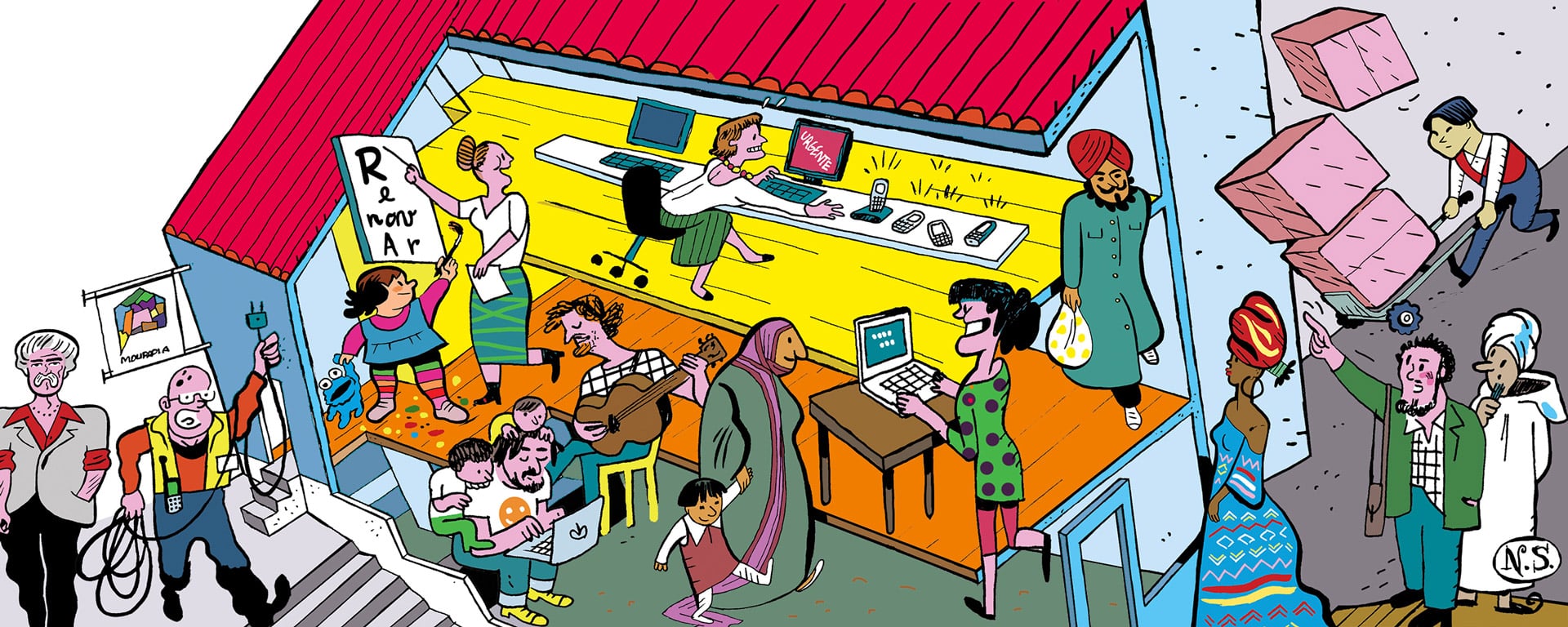
According to a study by the Renovar a Mouraria association, presented in January, Nepal, Bangladesh and Pakistan are currently the most common countries of origin in the neighborhood and the main mother tongues are Portuguese, Bengali, Nepalese and Urdu. Among the migrants surveyed, 40 mother tongues are spoken.
These migrants are mostly between the ages of 18 and 35 (53%), are more male than female (54% versus 45%), are married (48%), caregivers or caretakers (78%).
Ease of obtaining documents, search for a better quality of life and official family reunification were the main reasons that brought these migrants to Lisbon. The city was the first choice for 70% of the immigrants. 84% of the immigrants want to stay here. And many have projects for the future, like opening a business or working on their professional development.
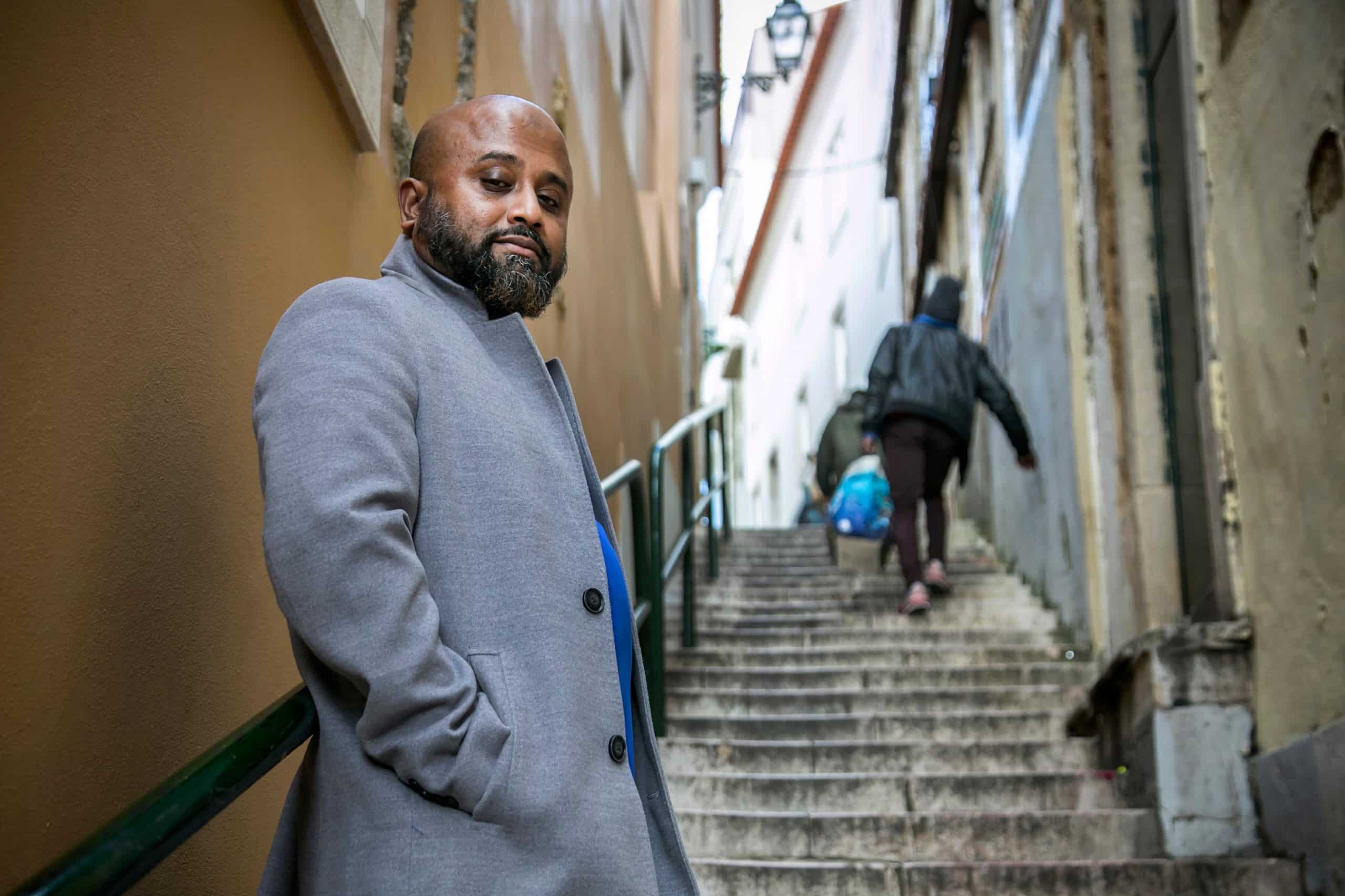
“Who wants to live like this? Nobody”
It was a week ago, on Saturday, long after the sun had set. Rajib was returning from evening prayers when, near his home on Terreirinho Street, he saw the smoke and smelled burning. “The fire wasn’t too big yet, the problem was that people weren’t getting out,” he says.
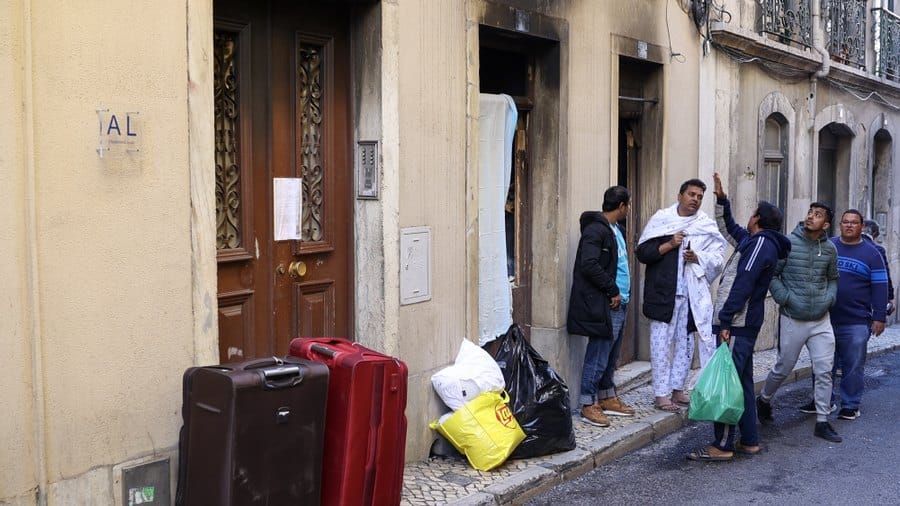
The problem was that the first floor, which was supposed to be a store, was being used as living quarters. The doors leading to the street were locked, reinforced with metal plates on the outside, and crammed with bunk beds on the inside. And, since the fire started with a short circuit in the electricity box right next to the door leading to the stairs, it was not possible to get out that way either: “People had to break the tops of the doors, and with great difficulty they managed to get out,” says Rajid, who was there at that first moment helping as much as possible until the fire department arrived. That night, 14 people were injured and two people died, one of them a teenager. 22 people were left homeless. All immigrants.
The owner of that right first floor guarantees that she rented the space for 750 euros and that she knew nothing about it. But it soon became clear that it was an illegal lodging, under subletting, where, in a small space and with few conditions, lived about 20 immigrants. “I go there every day and never realized that it was a shelter for Indian people. We don’t know what goes on inside the buildings,” says Rajib.
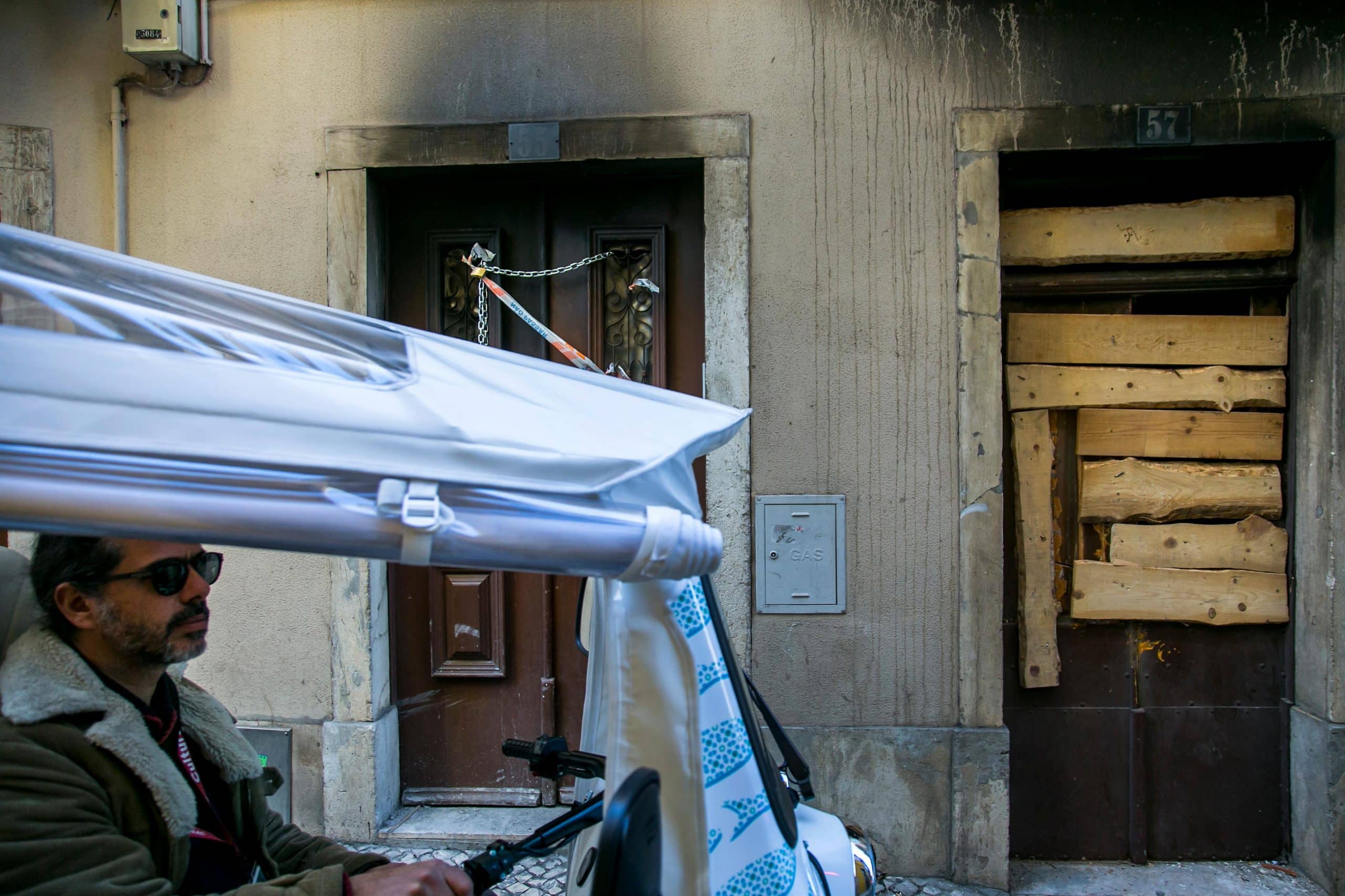
Didn’t we know? The fire brought to light a situation that is known to everyone, although officially nobody knows anything about it. It happened there, it could have happened in another building, one of the many in the parishes of Santa Maria Maior and Arroios where this type of housing is thought to exist. Houses that are transformed into dormitories, where the rooms take as many people as beds can be accommodated. The price per bed can vary between 150 and 300 euros, depending on the number of tenants. “A room with six people here in Mouraria costs 200 euros,” assures M., who arrived from Bangladesh two years ago and works in a restaurant on Benformoso Street. “There are too many people, you can’t have intimacy and the houses are not good, they have humidity and sometimes even have fleas, they are not clean… Who wants to live like this? No one does. But we don’t have the money to pay for a house.” M. moved to the Oriente area, where she shares a room with a friend, “It’s a little bit better.”
“This lack of housing conditions was silently known by the generality of the neighborhood, without us knowing how to act to change it, without us getting open testimonies about it,” admitted in a statement this week the Associação Renovar a Mouraria, which has been working for 15 years with the community and is a hand always extended to all who come to the neighborhood. “This fire was the dramatically visible face of the complex problems that currently inhabit Lisbon and the Mouraria, a neighborhood where more than 50 different nationalities live and where more than 40 languages are spoken, and whose migrant populations experience extra layers of social injustice. If access to housing and decent work are rights in question for all, there are migrants who have an even more difficult time accessing them, since migration implies a process of reintegration into a new social system in the destination country,” explains the association.
In five years the number of immigrants has almost doubled
According to data from the Foreigners and Borders Service (SEF), in 2021 Portugal had 698,887 foreign residents. Of these, more than 108 thousand were in the municipality of Lisbon. Among them, after the Brazilian, French, and Italian communities, there are those from Nepal (over 8 thousand residents), China (over 6 thousand), and Bangladesh (close to 6 thousand).
These numbers refer to 2021 and leave out all those who are not referenced, which allows us to think that today there will be many more foreign residents.
To have a term of comparison, ten years earlier in 2011 the municipality of Lisbon had 45,626 immigrants. At that time, only 711 citizens from Bangladesh, 1,784 from India, 853 from Nepal and 611 from Pakistan were registered.
In 2016, the municipality of Lisbon had just over 55,000 foreign residents. This means that in five years, the number of immigrants has almost doubled. There were then counted by the SEF 1,904 citizens from Bangladesh, 2,250 from India, 3,784 from Nepal and 729 from Pakistan.
“People come with big dreams”
When Farhana Arkter came from Bangladesh, it was not an easy decision. “It took a lot of courage,” she admits. She was an English teacher, had a stable life, was not unhappy. “But I wanted to do something. I decided to come, to try it, and if I didn’t like it I could always go back home.” It took some courage and some money, she admits. “But it all worked out fine.” Nowadays she works as a cultural mediator. She walks the streets of Mouraria handing out greetings, making conversation, asking questions, giving answers. Besides English and Bengali, she also speaks Hindi and Nepali and is learning Portuguese, which allows her to communicate with people from different backgrounds. “A mediator is much more than a translator. It’s not just about the language, there are many cultural differences, even between people in these countries. I understand those differences, and that’s why they trust me. I support people, I help them in all situations, whether it’s finances, social security, even smaller things like understanding how school works.”
“Imagine what it’s like to arrive in a place where you don’t know anyone and you don’t speak the language…There are institutions that help but people don’t know, that information is not given to them upon arrival.”
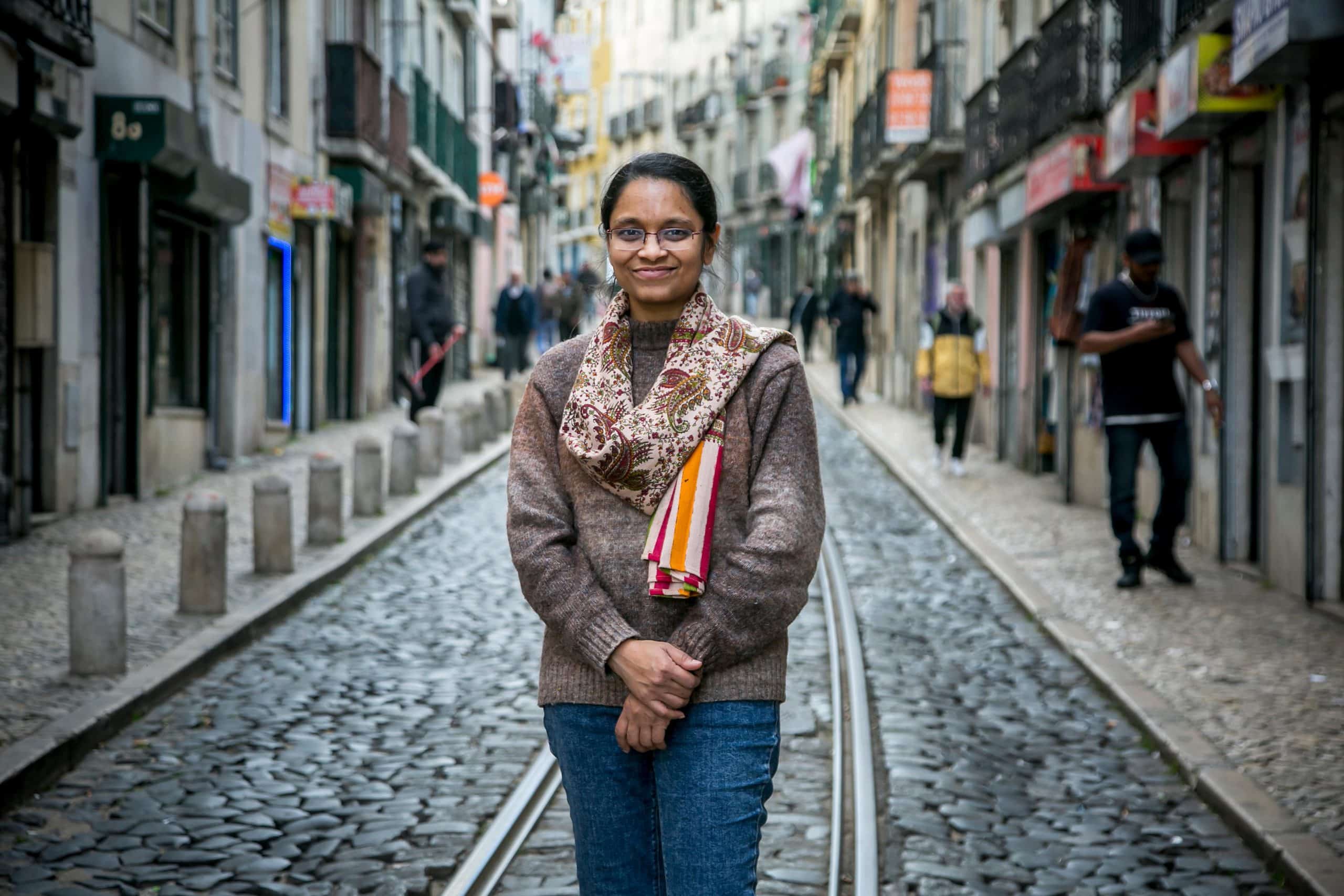
Farhana’s phone keeps ringing. There is always someone in need of help. “Many people live in very bad conditions. People come with big dreams, because in Bangladesh we have little money and we think that if we can earn a few euros and send it to our family it will make a difference. Even if it is little, it will be very good. But then, when people come here and face reality, they realize that it is not like that, because the money they earn is not even enough to live on let alone send to their family.”
The problems start right on the journey, says another Bangladeshi immigrant, Tahmina. People invest a large part of their savings (and there are even families who go into debt) to pay for travel and visas and to pay “facilitators” and “intermediaries” who provide them with work and accommodation upon arrival. In fact, in many cases, these are genuine human trafficking networks.
“People pay a lot of money to come, for the trip, for the visa, they spend their savings to be able to come in the hope of getting a good job,” says Thamina. “But the dream doesn’t come true. The country is very good, but many people don’t get a good job and a house. And then they have no way to come back.”
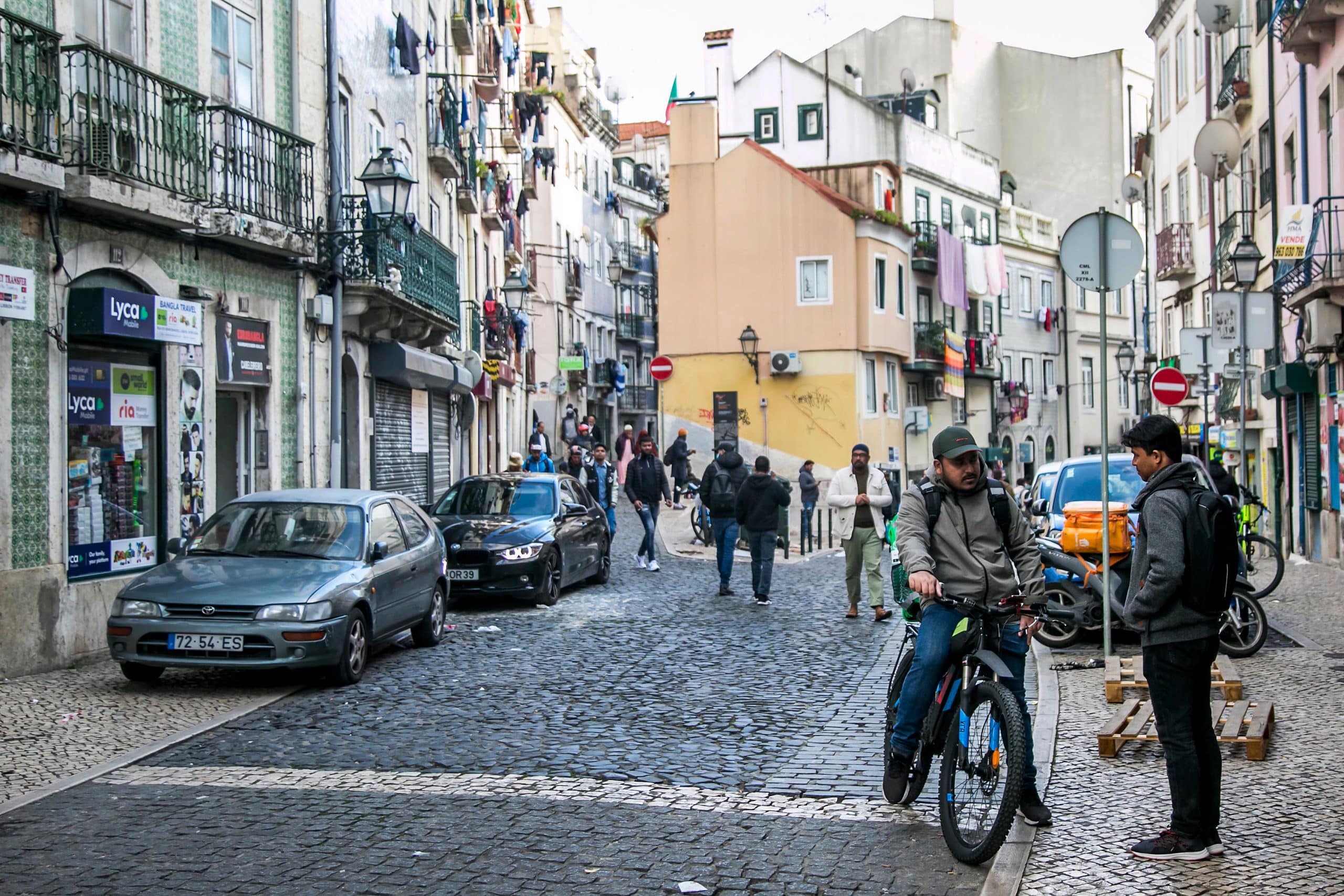
Then the bureaucracy begins. “As long as we don’t have the residence card we can’t get a job. But we need to survive here. How are we going to survive for these two years?” asks Tahmina. “We have to work hard and we don’t even earn the minimum wage, there are stores where they only pay 200 or 300 euros, but that’s not enough. So we have to bring a lot of money from our country, to be able to survive for the first few months, but then we really have to get a job.”
Without an employment contract, it is not possible to make a lease. But without a residence certificate it is also very complicated to get a work contract. It’s a catch in the tail. So the option is almost always to do some of these things illegally. In other words, you either accept work contracts that are almost like exploitation contracts, or you accept schemes to forge residency certificates. The goal is, for everyone, to get the parish council to issue the certificate of residence, and then wait two years to apply for the resident document. “There are always people who take advantage of these situations,” laments Farhana.
“And how can we afford a house?” questions Tahmina. “The problem is the same. Since we don’t have a resident card, we have to stay with someone who already has the card, we share the house. I share with a friend, but there are people who share houses with people they don’t know, and many people can stay in the same house. You have to stay three or four people in one room, that’s not good.”
Tahmina Akter has been in Portugal for almost three years. “I saw many videos on the internet and thought it was a beautiful country, with good weather and nice people. I had already come to Europe three times and had never been to Portugal. In 2020 I had the opportunity to come and decided to try it. I liked it and decided to stay.” At first it was not easy. “During the pandemic it was very complicated to get a job, and even now it is still difficult.” But she was lucky. As soon as she got her resident card, Tahmina took the opportunity to go see her family in Bangladesh because she was so homesick, and now she is going to change jobs. “I’ve been working as an accountant in a store in the Moorish Mall, but now I’m going to open my own business: a travel agency. It’s still under construction, but if all goes well, I’ll open it later this month. I used to work in a travel agency in Bangladesh, so I have experience and I also know that Asian people trust me. But it’s a very big investment, I’m a little bit scared.”
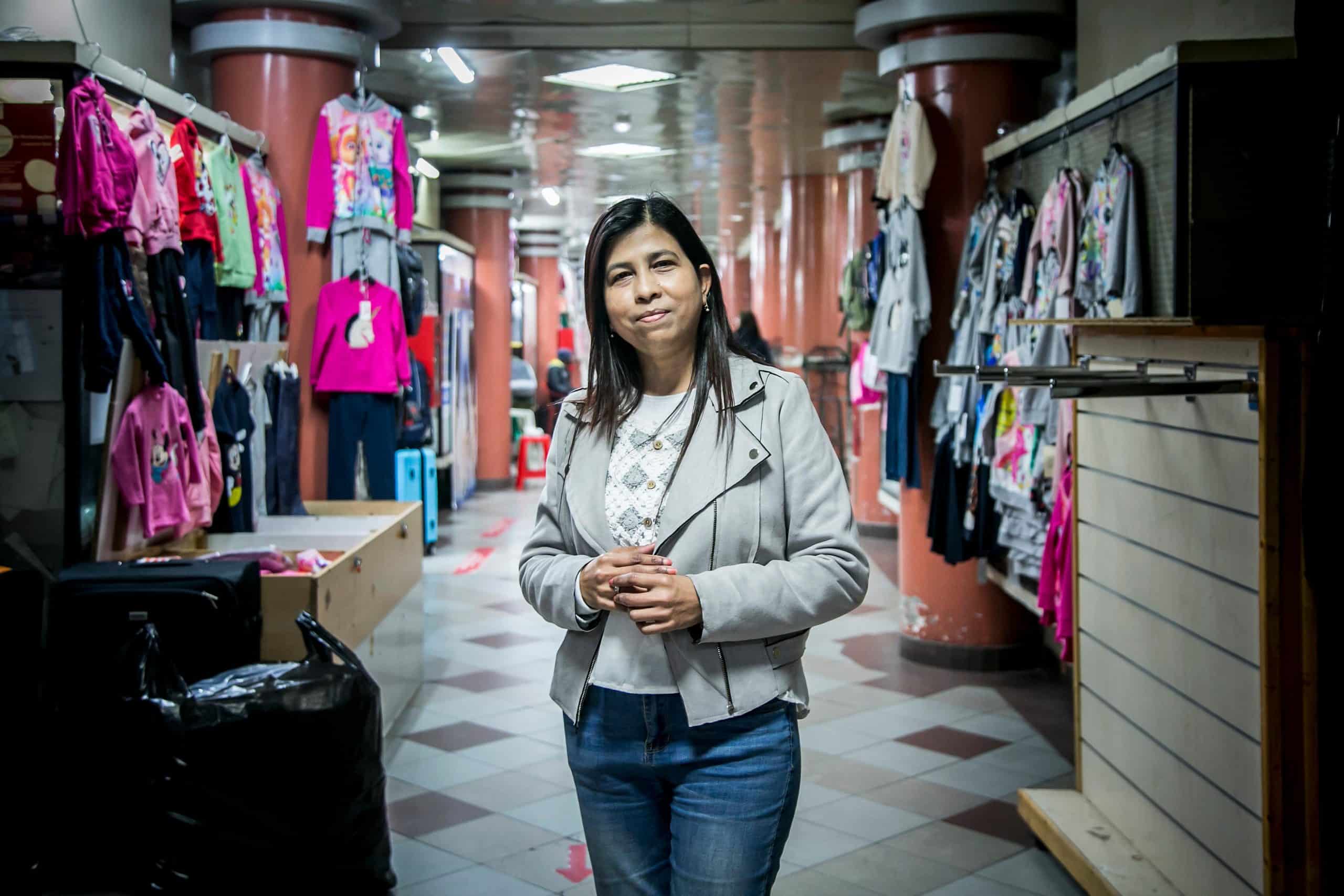
“Housing is not only a problem for immigrants, but for all people in Portugal”
In recent years, the Mouraria has, like other parts of the city, also become desirable to tourists, who are fascinated by this mixture of local traditions and oriental smells, and stroll through the narrow streets photographing the clothes laid out. This is how more and more local accommodation and hostels came to be. The price of rentals, eviction orders, and real estate speculation also increased.
“Politicians announce facilities for immigrants, but then people come and they have no conditions. It’s a problem that I don’t know how it will be solved. Housing is not only a problem for immigrants, but for everyone in Portugal,” says Rajib, who is already Portuguese and has financial stability, but still has problems with the owner of the house where he lives and recently had to hire a lawyer because he wanted to raise the rent in the middle of the contract.
Tahmina, despite working in Mouraria, lives in Algés. “Every day it takes me an hour to get here. If the train goes on strike it takes me almost two hours”, she laments. And Farhana also had to leave Mouraria recently: “one day the landlord said that he had sold the building and that I had two months to leave. I still tried to find another place, but it’s impossible here,” he says. “Even if you have papers and money, you can’t always get a house. Because there are a lot of people looking. So sometimes it’s almost like they have an auction. There is a price, but whoever makes the best bid gets the house. People with jobs, store owners, everyone is having a hard time getting a house.”
Whether due to the difficulty of regularizing the situation or the high prices, the situation often involves renting a room or, even worse, a bed. The study by Associação Renovar a Mouraria concluded that, within the migrant population living in the neighborhood, 36% live with non-family members and 2% even admit to sharing a house with more than 25 people. “We believe that these numbers don’t even correspond effectively to what happens on the ground. We did it with a sample of 300 people and there is 2% who say they live with more than 25 people in the same house. We believe that the scenario is even worse,” says Inês Andrade, the association’s project manager. “Besides this, there are situations of discrimination. Landlords refuse to rent houses to migrants, even when they are in regular conditions, on an equal footing with Portuguese or European families,” says Inês Andrade.

Illegal housing has been the alternative for many of these people. Illegal means, almost always, without conditions. But the association still believes that the problem should be solved and not aggravate the immigrants’ situation. As Farhana says, enforcement is not the solution. “If the police or the city council comes to inspect and close these accommodations, people will stay on the street because they can’t pay more than this. Or else they move to even worse places.”
“If people live in such miserable conditions it is because they have no alternatives,” concludes Farid Akmed Patwary. He has his professional journalist’s license hanging under his jacket. The card opens official doors for him, but it is his origin that opens other doors here in the Mouraria. Farid came from Bangladesh eight years ago with his family: “I’m trying to make my dream a reality,” he says on his website. He is trying to make his dream come true. When we talk about the fire a few days ago and the problems of immigrants, he gets a little emotional and apologizes. “I am also an immigrant, these stories always move me.”
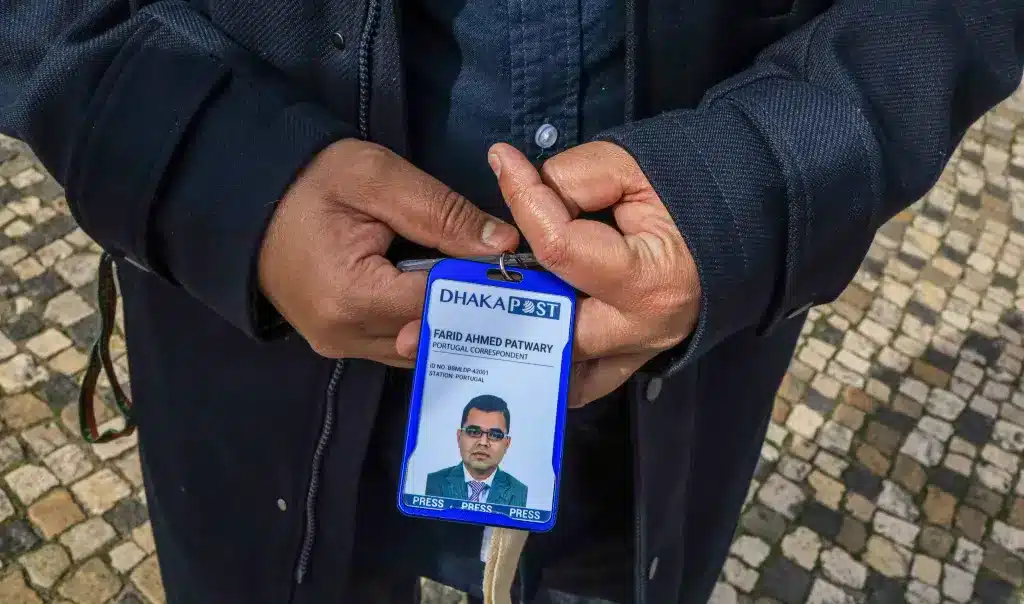
“People even get jobs, but many have nowhere to live because in the cities wages are low and rents are high,” explains the journalist. “The number of available houses has been decreasing due to the boom in the tourism sector. Everyone who has apartments or houses decides to rent them out by the night, to make more profit. They turn residential buildings into hostels or local accommodations.” Just walk down the street a bit, nose in the air, to see the signs advertising the businesses.
“When there are accidents or problems in which immigrants are involved, people immediately blame the immigrants, but nobody comes up with solutions. If the Portuguese government welcomes immigrants, it should have an integrated plan – one that includes employment and housing. We should not forget the important role that immigrants have in the job market,” Farid says. “There are so many old houses in Lisbon that could be remodeled, houses that are abandoned. That would increase the number of available residences. On the other hand, the rental policy should establish a limit value, according to the type of housing. And there could also be tax benefits for those who rent their homes to immigrants.”
“People are living badly but they don’t want to come back. Many of them have spent all their money to be able to be here. Moreover, they know that it will be just as difficult to start life again in their country. So they believe that maybe the problem will be solved before long and they will be able to have a good life.” Meanwhile, time goes by…
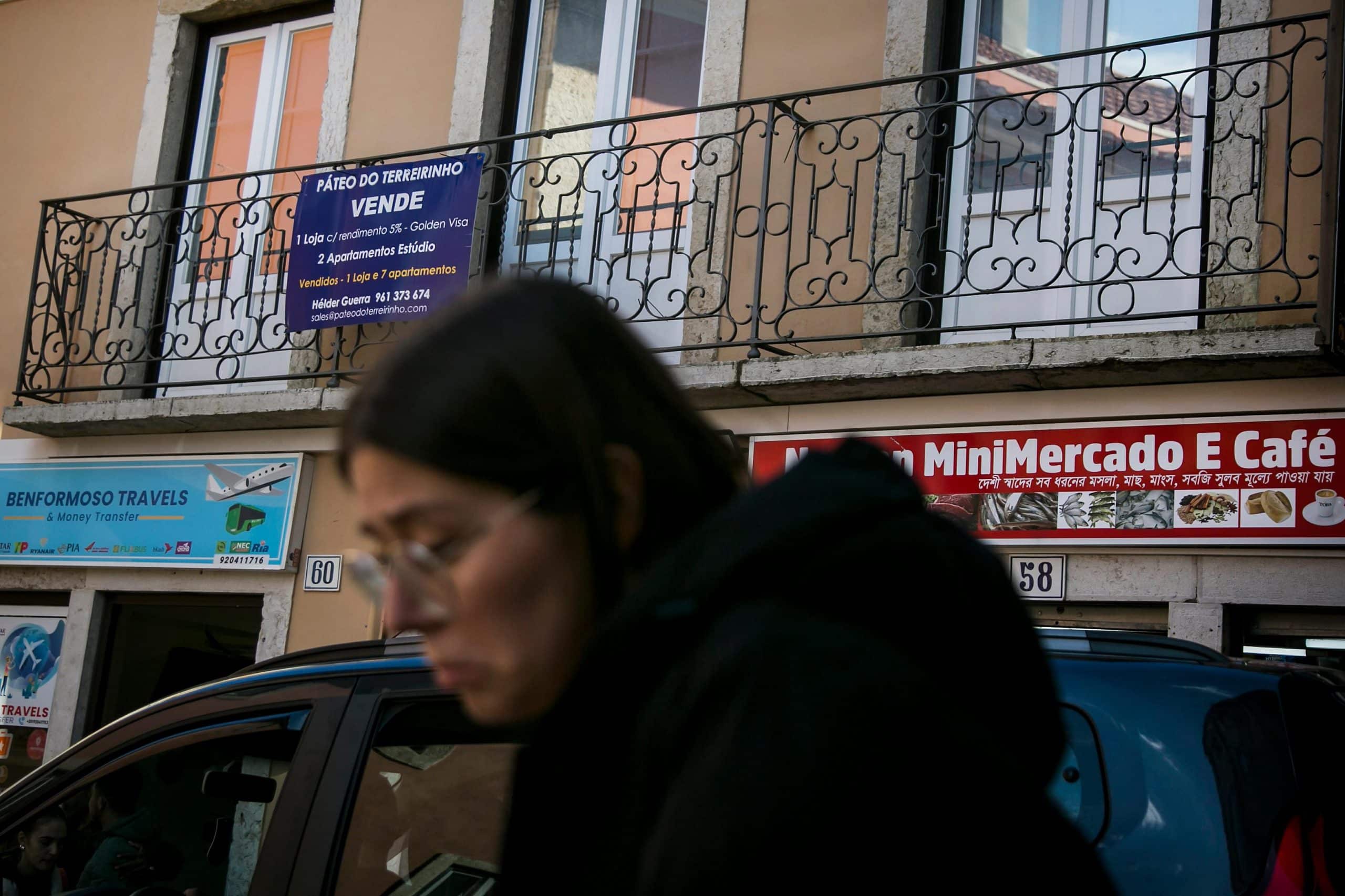
In Dipa’s house, there is always a sofa available
“In Nepal I had no future for my children.” That is why, even with many doubts, Dipa decided to emigrate. First her husband came to Lisbon, then she came with her two children, a boy and a girl. “The hardest thing was the language,” she admits. Six years later, Dipa confesses that she understands Portuguese, but still speaks few words: “We have to work hard for our children”, she apologizes. She doesn’t have time to take classes. Her children are already in school and, like all children, they quickly learned the new language and new habits. But for Dipa, it has been a long process: “Now I can say that I like it here, but I really miss Nepal and my friends,” this 38-year-old woman tells us in a sweet voice and with a disarming shyness.
After a few years working in other restaurants, last year Dipa and her husband opened their own business. In Beco dos Cavaleiros, the Odaan restaurant, with its Indian and Nepalese food, and the Pastelaria Doce Mila, which makes its own “pastéis da mouraria”, made with white beans and almonds, co-exist peacefully.
In addition to owning the restaurant, Dipa is the vice president of the Nepali association. “She doesn’t look it, but she is a leader,” Fahrana tells us when introducing her. While her husband is lost in the kitchen preparing the “momo” (a kind of fried dumpling ) and the “pani puri” (some potato and grain dumplings with a special sauce), Dipa receives phone calls from people who need help and to whom she can’t say no. “People come in and don’t know anything, so someone offers to help them take care of the documents in exchange for a payment. People pay a lot of money and it’s unfair, because you don’t have to pay to get the documents. And some are cheated.” Dipa fights against this. She defends the rights of Nepalis and the community has recognized her work, electing her vice president 14 months ago. “When people have problems, if they are in the hospital or are sick, if they don’t have a job or need a home, they call me. When someone dies, I have to take responsibility and collect money in the community to have a funeral or to send the body to Nepal, which can cost three thousand euros. Most people can’t afford this.” Since taking over the vice presidency, Dipa has had to deal with sending more than ten bodies.
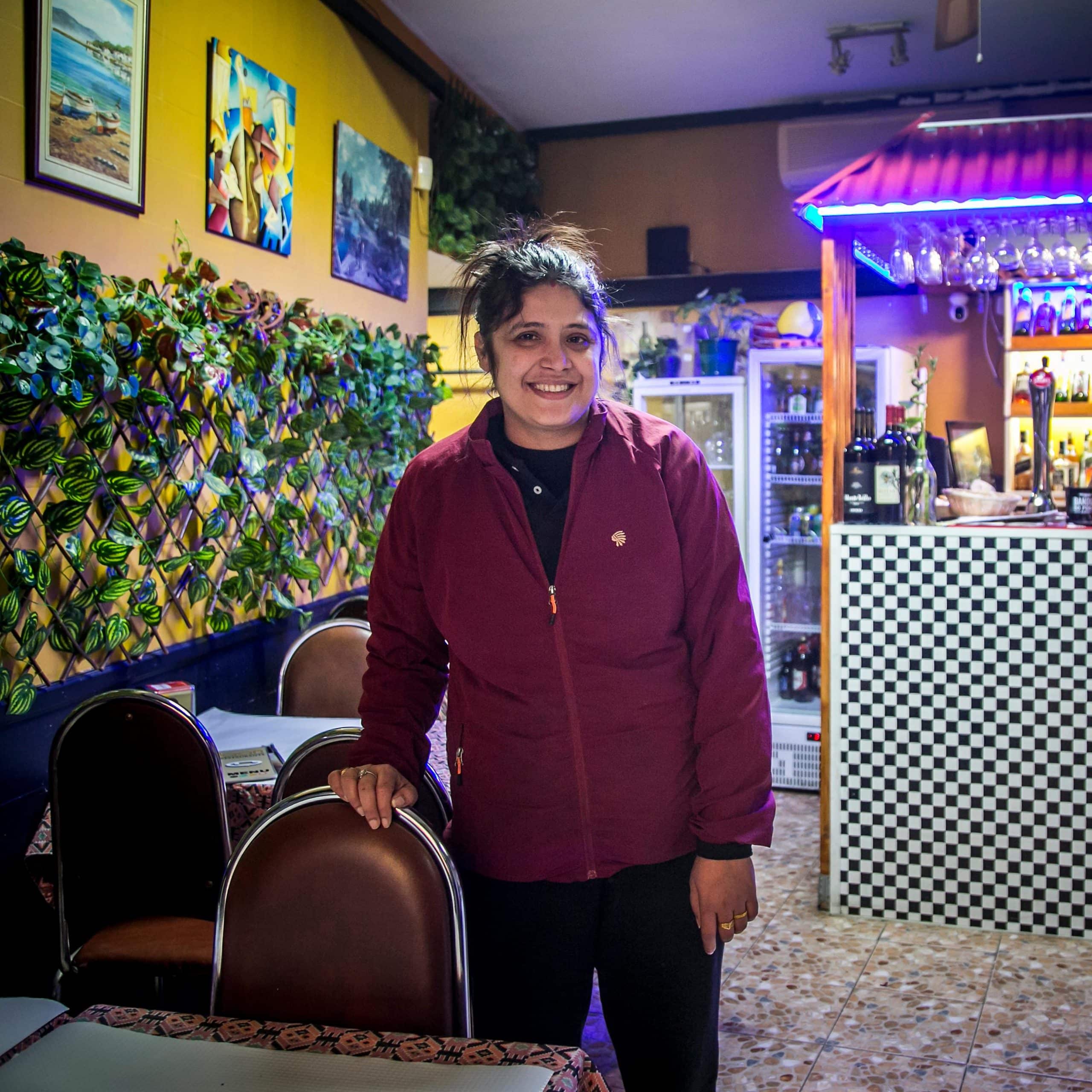
Every week, someone comes along who needs food or a place to stay. Other times she brings people she finds sleeping in cardboard boxes on the street in the cold. Dipa has lost count of the Nepalese she has sheltered in her own house, which is not even that big. “But there’s always the couch,” she says. “I feel like I’m a guardian, I have to help people who come from my country.” Not long ago, the vice president went to Zambujeira do Mar, to see the conditions in which the immigrants were living there. “There were people who hadn’t worked for four or five months and were crying a lot, because they had no money and didn’t know what to do.”
But why do they keep coming? “People don’t know. They think Europe is a dream. And even if we try to tell them, don’t come, there are many problems; people don’t believe it, because we are here, so how can we tell them not to come?”

